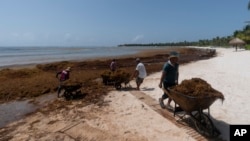Belize is developing a pilot project to convert the masses of foul-smelling sargassum seaweed swamping its pristine beaches into biofuel, its prime minister said in a statement published by regional Caribbean bloc CARICOM on Tuesday.
Many Caribbean countries depend economically on drawing travelers from around the world to their white sand beaches, but since 2010 heaps of rotting seaweed have been massing on the shores for reasons scientists do not yet fully understand but suspect are related to climate change.
Floating sargassum provides shelter and food for marine animals but as it washes ashore it can smother ecological habitats and begins to rot, becoming harmful to humans.
Belize Prime Minister John Briceno said in the statement that the $50 million facility, the result of a public-private partnership with German company Variodin, would convert municipal solid waste and sargassum into diesel fuel replacements.
The facility could be scaled up with more financing, he said, adding that it would sign a power purchase agreement for energy generated from the plant.
"The sargassum seaweed invasion [is] causing economic, social and environmental wreckage across Belize and the Caribbean," CARICOM said, citing estimates that the region spends $120 million a year to collect and dispose of it.
"Removal is a vicious cycle of never-ending sargassum, a cycle that removes the seaweed but also the sand, causing further damage to the coastline," it said, noting that 24 million tons landed on Caribbean coasts last year — damaging tourism, the fishing industry and people's health.
Briceno said that while complete mitigation is no longer possible, control is within reach.
"Research conducted shows that conversion of sargassum into the Belize energy mix is a viable solution to the problem," he said, without detailing when the plant would be operational.





